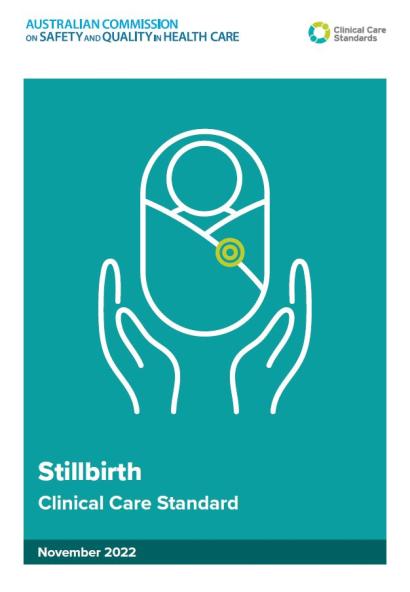Stillbirth Clinical Care Standard
The Stillbirth Clinical Care Standard supports best practice care for stillbirth prevention and investigation, and bereavement care following perinatal loss.
The National Standard was released by the Commission on 4 November 2022.
About Stillbirth
Stillbirth is a tragic and profound experience that affects more than 2,000 families in Australia every year. In Australia, of approximately 820 births, six babies are stillborn every day. Stillbirth is defined as the birth of a baby without signs of life, at 20 or more completed weeks of gestation or at a weight of 400 grams or more.
Download the standard
The Stillbirth Clinical Care Standard includes:
- Ten quality statements describing the care that should be provided
- A set of indicators to support monitoring and quality improvement
Information and resources are available for consumers, clinicians, and healthcare services or you can download the full clinical care standard.
Communications resources
Show your support for the clinical care standard by downloading and sharing the content on your website, social networks or within your health service organisation.
To help you share and promote the clinical care standard within your networks, a
communications kit and launch presentation slides are available for download.
National launch and live webcast
The Stillbirth Clinical Care Standard was launched on 4 November 2022 at the Annual National Stillbirth Forum. See the expert panel discuss key challenges and best practice in preventing stillbirth, investigations after stillbirth and the importance of bereavement care after any perinatal loss.
Consultation and endorsement
The standard was developed in consultation with a topic working group of clinicians, researchers and women with lived experience of stillbirth. Public consultation on the Clinical Care Standard was carried out between February and March 2022.
The standard has been endorsed by 26 key professional associations and consumer organisations including the Australian College of Midwives (ACM), Australian College of Nursing, Australian Preterm Birth Prevention Alliance, Australian Psychological Society, National Aboriginal Community Controlled Health Organisation (NACCHO), Red Nose, Royal Australian and New Zealand College of Obstetricians and Gynaecologists (RANZCOG), Royal College of Pathologists of Australasia (RCPA), Stillbirth Foundation and the Stillbirth Centre of Research Excellence.
The Standard has also been supported by the Federation of Ethnic Communities Councils of Australia (FECCA) and the Royal Australian College of General Practitioners (RACGP).
Evidence sources
Further information is available on the evidence sources used to inform the development of the Stillbirth Clinical Care Standard.
Background
In December 2020 the Department of Health and Aged Care released the National Stillbirth Action and Implementation Plan (NSAIP) which aims to reduce rates of preventable stillbirth (after 28 weeks gestation) by 20% by December 2025. It also aims to ensure that, when stillbirth occurs, families receive respectful and supportive bereavement care.
The development of a national Clinical Care Standard for stillbirth is described in the NSAIP within ‘Action area 7 - Developing and implementing a national evidence-based, culturally safe stillbirth education program for health professionals’. The NSAIP proposes that the Standard should support health professionals to provide optimal, evidence-based care to improve outcomes for women and families. The Department has provided funding to the Commission to support the development of this Standard.
The NSAIP outlines 14 action areas, and is available at www.health.gov.au/maternity
Development of a clinical care standard for stillbirth prevention and bereavement care
This Clinical Care Standard aims to reduce unwarranted variation and improve the appropriateness of care for stillbirth prevention, and the quality of bereavement care following perinatal loss. The Standard also supports the delivery of evidence-based clinical care, and promotes shared decision making between patients, carers and clinicians.
The Clinical Care Standard reflects current best practice and guidelines on stillbirth prevention and management, including the Clinical Practice Guideline for Care around Stillbirth and Neonatal Death1, the Clinical Practice Guidelines: Pregnancy Care2 and the Safer Baby Bundle3.
The Commission has also taken into account the findings of the Fourth Australian Atlas of Healthcare Variation4 - which reported high rates of planned caesarean section births performed before 39 weeks (2017 figures) without a medical or obstetric reason - in order to avoid any unintended consequences on early planned birth rates.5
Read more about the scope and goal of this Standard, or see further background in the full clinical care standard.
References
Contact us
If you have questions about this clinical care standard, please email ccs@safetyandquality.gov.au.
For future updates on standards due to be launched and out for consultation, follow us on X (Twitter) @ACSQHC or subscribe to our eNewsletters.

